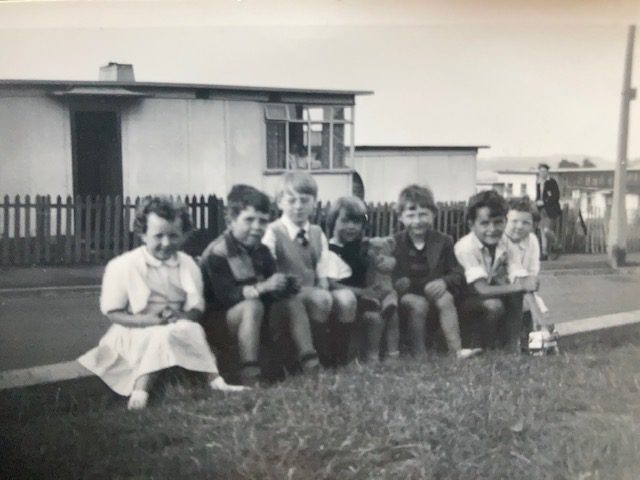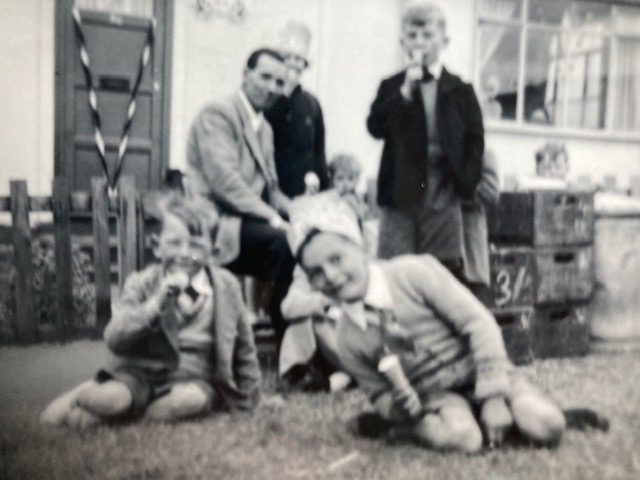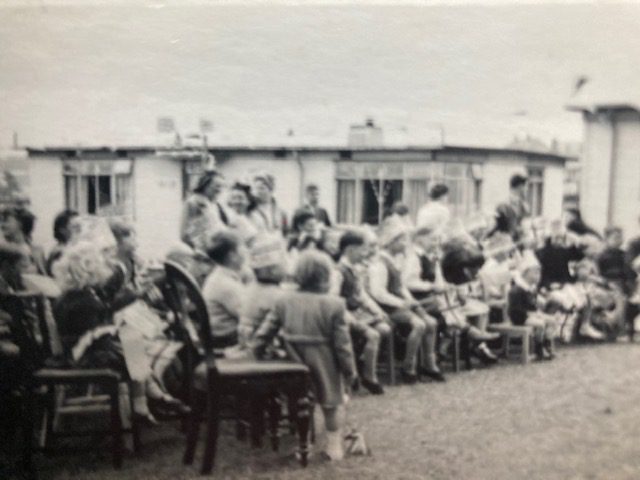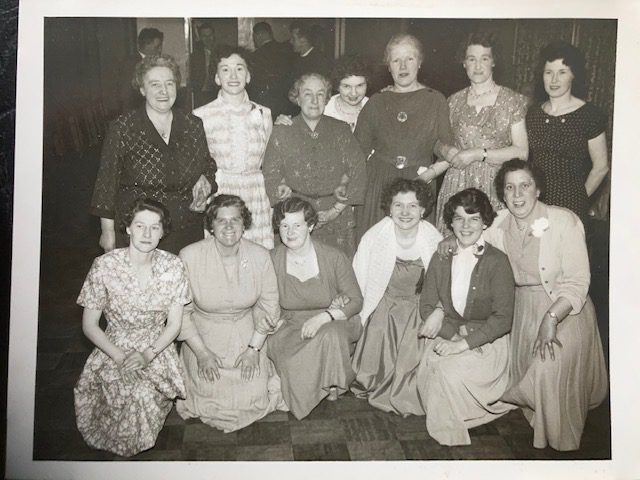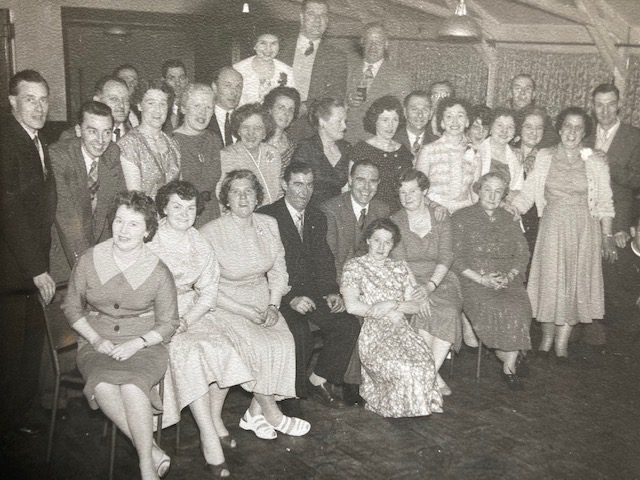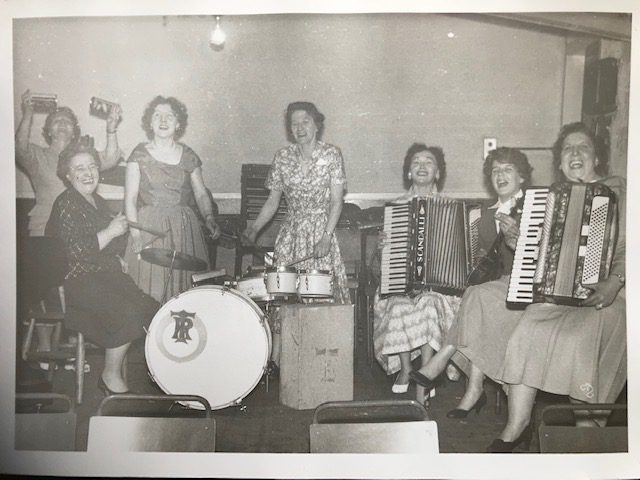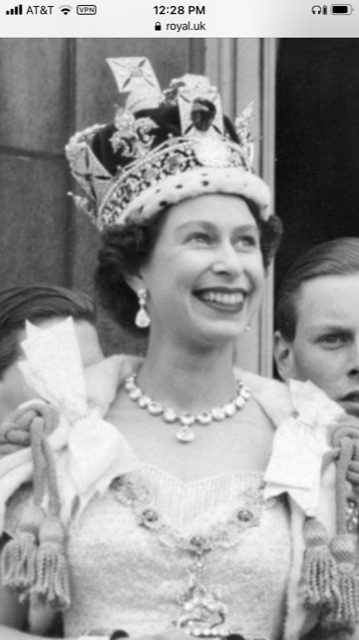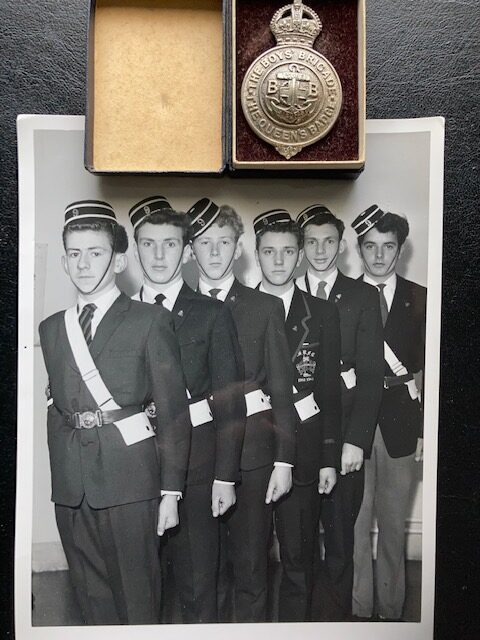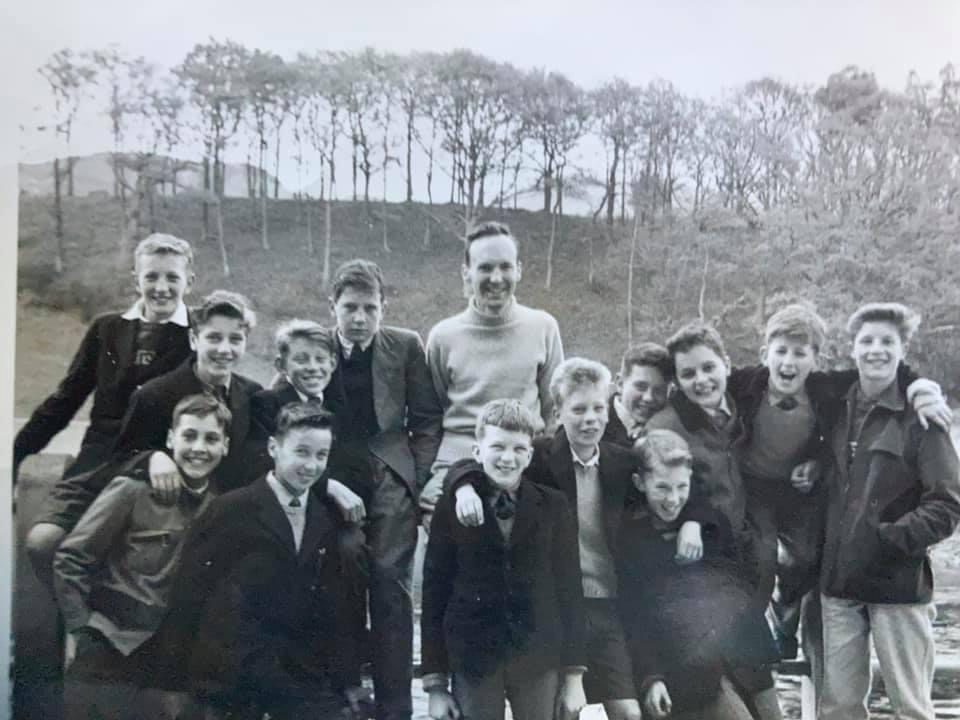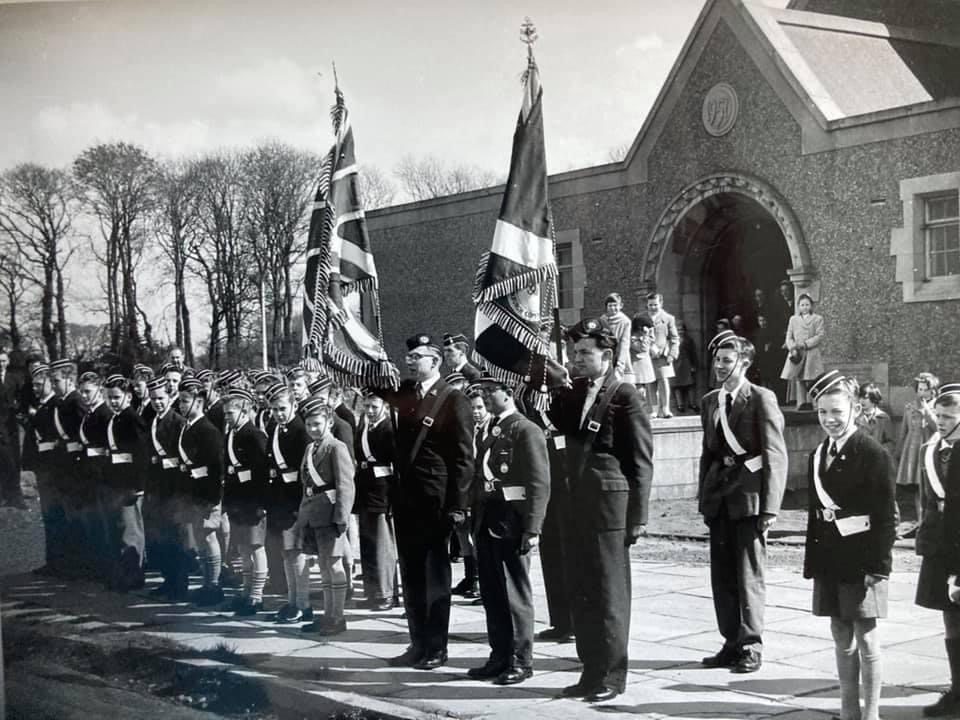Out of the Camp Ch. 25 – The Dragon & the Coronation
My first memory of church was as a member of the Tron Church Junior Choir when we performed an operetta called ‘The Dragon of Tangly Mountain’ by Gertrude Sullens. I remember the first couple of lines of the song sung by the chorus which went, “Poppies in the corn are gently swaying, Slyly peep the cornflowers too.” It was supposed to be scary with a dragon. I must have been 5 or 6 years old and had a very small role as a palace page boy who made only one appearance in the play making an announcement to the gathering. I don’t remember anything about the announcement except that it concerned a very serious matter and so I couldn’t understand why the audience and everyone else was laughing. I mean, it was supposed to be scary. Actually, that was the most lasting impression I was left with. I couldn’t understand why everyone was laughing. There were two performances of the play on consecutive nights, and I actually shared the role with a pal. He did one night, and I did the other. Believe it or not we’re now Facebook friends. I mean, this was the 50s and I’m wondering if he remembers this. He’s been reading some of my inane ramblings so I might hear from him.
Our director was an elderly buxom lady called Miss Murray and she would both play the piano and direct us. She was quite serious about everything, I mean, I don’t remember her laughing much but I liked her. Actually, she reminded me of Margaret Rutherford, maybe that’s why. Margaret Rutherford was an English actress and a huge star, best known for her comedic roles in several successful films in the 50s and, in the early 60s, the first actress to portray Agatha Christie’s Miss Marple onscreen. I’ve no idea what became of Gertrude Sullens. She’s dead now, of course, and according to Amazon she apparently wrote a couple of other children’s operettas, The Enchanted Emerald and The Missing May Queen.
I started going to church shortly after the operetta, well, Sunday School, actually, which was run by the minister’s daughter, Anna, who was very sweet but hopeless at controlling kids, so we all had great fun but didn’t learn much. This was the Church of Scotland, and communion was given once a month when my mother would drag me along early to attend the service with her and I’d have to go to Sunday School after the service as well. As I recall, the church was a small, spartan building but it was the minister who made the biggest impression on me. Looking back, I’d describe him as a classic Blood & Thunder, tub-thumping, old school, evangelical Church of Scotland Minister, with his rich baritone offerings he represented to a little boy, a positively terrifying visage in the pulpit, replete with hairy flaring nostrils, walrus moustache, a manic stare, high forehead with acres of hair flying behind him. Indeed, if anyone saw the film, ‘Cold Comfort Farm’, Ian McKellen’s brilliant portrayal of the Rev. Amos Starkadder provided a wonderful representation of the form of fundamentalist rant regularly delivered by the Rev. Ireland to – and its effect on – his petrified flock, sans the Scottish accent, of course. No pics of any of this. Sorry!
The Coronation of Queen Elizabeth II took place on June 2, 1953 in Westminster Abbey, the thirty-ninth British Sovereign to be crowned there. The Coronation service used descends directly from that of King Edgar at Bath in the year 973, and was used until the Coronation of Elizabeth I. Meanwhile, all over the UK people celebrated the occasion with street parties, fairs and dances. Residents of Moredun Park Avenue had formed an association months in advance of the big day, to organize such a neighborhood party for residents of our street. Since we had a small park directly in front of our prefab, it was decided that the primary location of the celebration would be there. On the big day our little park was overwhelmed with people eating and drinking from temporary stalls created from boxes and crates that had been set up. Some were sitting, some standing, and some were dancing to music from a record player that had somehow been hooked up to an electrical outlet. Celebrations including a performance from a magician which had started in the early afternoon went on into the night with fireworks, and the entire day had been a huge success, so much so, that the committee that had been assembled to organize the event, decided that they would continue to meet in order to discuss the possibility of organizing further events and celebrations in the future.
This marked the launch of the Coronation Club and the start of a local tradition which went on for years following the crowning of Queen Elizabeth. The first event to be held was the local kids’ Christmas Party and as far as I remember this was always held in St. Barnabas Church Hall in Fernieside. Other regular events were the annual trip to the seaside. I remember going to North Berwick more than once, St. Abbs one time only because it was much further than the alternatives, and we also travelled to Gullane a few times. One year when we were there, I cut my foot on some broken glass on the beach early in the day, and Rev. Ireland and, Anna, his daughter who were in attendance poured some water on it, covered it with a sticking plaster (band aid) and allowed me to continue playing on the beach for the rest of the day. By the time we got home that evening I remember I was in some distress with the pain, and Rev. Ireland took me home. I’m pretty sure he regretted that decision because when my mother heard about what had happened and that it had been early that morning, she completely lost it and laid into the good Rev. He clearly wasn’t expecting what came next nor used to being addressed in such a forthright manner. That’s putting it politely! My mother called Dr. Thompson, our GP, explained what had happened and he told her to bring me to his surgery (office). I don’t know now how we got there because I couldn’t walk, and nobody in our street had a car. Somehow, we made it, Dr. Thompson cleaned and dressed the wound, I screamed merry hell and we went home. I should mention that this was well into the evening. Can you imagine that happening today?
Sorry, got a bit carried away with all that drama. Anyway, the Coronation Club’s regular events were the children’s Christmas Party and the annual seaside bus trip, in addition to which there were the occasional Whist Drives for the adults at the local pub, ‘The Robin’s Nest’, which were held usually 3 or 4 times a year and an annual dance and, of course, a big Hogmanay celebration every year. Actually, that was on the calendar well before the birth of the Coronation Club, as you’d expect. For all of this the residents paid a modest annual subscription to cover basic expenses and occasionally an additional amount to fund purchases of food and drink for specific functions.
The first time I ever went away on my own was when I was twelve and went to the Boys Brigade annual camp, that year in Comrie, Perthshire. From the moment we arrived there I felt freer and happier than I had ever remembered being before. My ever-vigilant mother wasn’t around, and I could relax and enjoy myself. That’s not to say that there wasn’t always work to be done and that we had no responsibilities. Quite the contrary, but it was fun, and we all laughed and mucked in together. When we first arrived, the advance party had gone ahead a day or two earlier and set up all the tents, the marquee for assembly and meals, erected a flagpole, and generally prepared the campsite for our arrival which was located by a burn (stream) in a valley surrounded by hills and looking back, I can say was absolutely idyllic. Indeed, my first spiritual experience, I believe, took place on one of those hills.
Early one afternoon I took a stroll up the nearest hill or Monro (A Monro is a hill in Scotland with a height over 3,000 feet). It was a beautiful, warm summers day, a gentle breeze was blowing and despite being completely alone, I was suddenly aware of a presence. It didn’t speak to me, there was no sound and all I was aware of was its power and the overwhelming sense of joy that I felt which was so all consuming that I still recall the sensation all these decades later. The memory of that day remains with me and I’m almost able to recreate the sensation at will. I must have stood there for 10 minutes not knowing what to think and caring less but sensing that this was coming from within. Was it God; I think it probably was but I wish he’d said something or maybe he did & I was just too dumb to hear Him. Anyway, speaking of joy, it was around this time or slightly later that I found music and began learning to play the side drum in the BBs and shortly thereafter became a member of the 9th Edinburgh Boys Brigade Company’s Scottish Pipe Band.
But, back to the camp. Whenever I hear the 60s hit song, ‘Teenager In Love’, by Marty Wilde (Dion & the Belmonts in the US), I’m instantly transported back to those days in Comrie. This is because many of us used to congregate in the village ‘Milk Bar’ as they called them in those days where, naturally, there was a juke-box and where we’d listen ad nauseam to the hits of the day. ‘Teenager In Love’ happened to be my particular favorite. I also remember that year there being a myxomatosis epidemic amongst the rabbit population and, on parent’s day, some of the older boys decided to construct a spit in the middle of the campsite and put on a display of some of the poor, wretched creatures that they’d managed to ‘finish off’ with crudely fashioned cudgels. As I recall, by the time the parents arrived, there was no sign of said exhibition and, since I’d made myself scarce after the thing was erected, I imagine the culprits were lined up and told in no uncertain terms to move it!
Another song from that era is Joe Brown’s, ‘Picture Of You’. This takes me back to the annual camp held at Carnoustie a year or two later. The reason that this tune is so evocative, again, is because it was played constantly on our transistor radios and happened to be another particular favorite of mine. The event that this song provokes in my memory is a talent contest that I entered, and which was held, I think, in the Carnoustie Beach Hall. A large crowd of us from the company were there, and I remember very clearly coming in second in the contest having sung unaccompanied, a pop song no doubt popular at the time, though I can’t remember which one. I was beaten in the contest by a classically trained tenor, who was accompanied by his own pianist and so I maintain it was not a fair fight but consoled myself with second placing. By the way, did I mention that the total number of contestants in the contest was TWO! Looking back, it seems odd that the hall was packed with holidaymakers for such a sad event as a talent contest with only two entrants. I’m pretty sure that this was part of an evening – or afternoon? – featuring a variety of items that had attracted the large crowd. It’s the only explanation, really! Memories, memories.
Images.
(1) 1950s Moredun neighbourhood kids L-R: Elizabeth & Derek Stewart, James Smith, Marilyn & Alan Baird, me & I don’t know who the little girl on the right is. (2) Queen Elizabeth II’s Coronation Day, June 1953. That’s me in the front with the party hat, but I can’t recognize anyone else. Isn’t that terrible! That’s our prefab at the back and my Mother peeking out the window, there for posterity! (3) Coronation Day. Getting ready for the magician. (4) Moredun Park Avenue residents celebration. Back row L-R. Mary Stewart, Elsie Smith, Auntie Betty, ?, Mrs Webber, Mrs Morrison, ?. Front row L-R: Hazel Cairns, Ella Morrison, Mrs McMillan, Cathie Baird, Mrs Gifford, Betty Cant. (5) More of the same wonderful neighbors and even more folk I don’t know. (6) L-R: Ella Morrison, Mary Stewart, Cathie Baird, Hazel Cairns, Elsie Smith, Mrs Gifford, Betty Cant. (7) Her Majesty. (8) Queen’s Men: L-R David Peacock, Jim Alexander, Joe Imrie, Bob Legerwood, Graham Gill, me. (9) Boys Brigade outing somewhere, no idea where or when. Captain Syson in the middle. I’m third from the right. (10) Sunday Parade at the Tron Church, Moredun, late 50s or early 60s.
